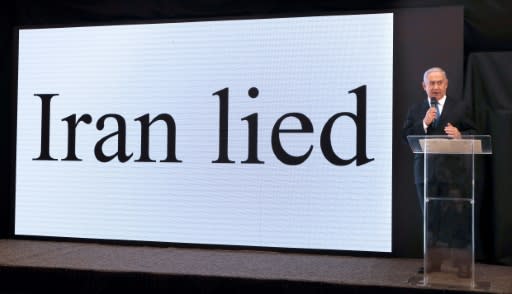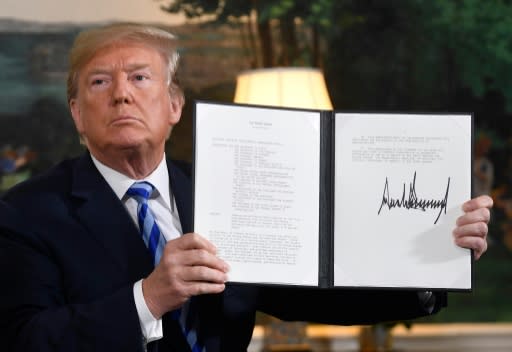Netanyahu sees victory over Iran deal, but dangers lurk
Israeli Prime Minister Benjamin Netanyahu has gained a long-sought personal victory with US President Donald Trump's withdrawal from the Iran nuclear deal, but the move could further ramp up tensions between his country and Tehran. Netanyahu gave a televised address minutes after Trump's announcement on Tuesday to express his strong backing for the "historic" decision, announced in a speech in Washington that reflected many of the Israeli premier's positions. The announcement came after Netanyahu's elaborate unveiling of tens of thousands of intelligence documents on Iran's alleged nuclear ambitions last week, which Trump mentioned in his speech. Supporters of the nuclear deal say there was little new information in the intelligence documents and that they in fact illustrated the importance of the accord -- points that Netanyahu disputes. Within Israel, Trump's decision won enthusiastic support. Many Israelis are concerned over Iran and its threats against their country, frequently highlighted by Netanyahu. "US President Donald Trump read out a synopsis of Israeli Prime Minister Benjamin Netanyahu's speech. Word for word, and with no mistakes," Israeli analyst Ben Caspit wrote in Maariv newspaper. "Every rational Israeli should today cheer Trump and admit honestly, with no relation to political affiliation, that this is also Benjamin Netanyahu's resounding victory." With that victory in hand and heavy sanctions set to be reinstated against his country's main enemy, Netanyahu got down to tough diplomacy Wednesday, travelling to Moscow to meet Russian President Vladimir Putin, who supports the nuclear deal. Their talks were likely to centre on Syria and by extension, Iran. Netanyahu could call on Moscow to use its relative influence to try to curb Tehran, said Emily Landau of Israel's Institute for National Security Studies think tank. - 'Irregular activity' - Beyond the nuclear deal, Israelis are deeply concerned over Iran's presence in neighbouring Syria. Iran, like Russia, backs Syrian President Bashar al-Assad in his country's seven-year civil war. Israel has pledged not to allow Iran to entrench itself militarily next door and has been accused of carrying out a series of air strikes there that have killed Iranians. The latest came on Tuesday night, when a suspected Israeli strike hit an alleged Iranian weapons depot on the outskirts of Damascus. Eight Iranians were among those killed, according to the Syrian Observatory for Human Rights monitoring group. The strikes have raised fears in Israel of potential Iranian retaliation, and on Tuesday -- just before Trump's speech -- Israel's military asked authorities in the occupied Golan Heights to open and prepare missile shelters. The notice was due to "irregular activity by Iranian forces" over the demarcation line in Syria, the military said. Netanyahu and Putin have held a series of meetings and phone conversations in recent months, particularly related to Syria. The two countries have established a hotline to avoid accidental clashes in the war-torn country. Israel has not acknowledged the recent strikes that have killed Iranians, but it does admit to carrying out dozens of other raids in Syria to stop what it says are advanced arms deliveries to Iran-backed Hezbollah, another of its enemies. It hopes to maintain the ability to do so. - 'A better agreement' - Netanyahu has long made it his personal quest to change or cancel the nuclear deal, going as far as to defy then-president Barack Obama and address the US Congress in 2015 to lobby against the accord, which was still being negotiated. Israel will now be closely watching Iran's response to Trump's decision, particularly over uranium enrichment, which was constrained under the deal. "The policymakers in Jerusalem and in Washington must prepare and plan strategy for far more problematic Iranian responses," Amos Yadlin, director of the Institute for National Security Studies, wrote in the Yedioth Ahronoth newspaper. "A likely Iranian response, even if not an immediate one, would be a return to the enrichment policy that was in place before 2013." All other parties to the agreement -- Russia, France, Britain, Germany and China -- still support it and say it is the best way to keep Iran from obtaining nuclear weapons. Trump and his allies in the Middle East, particularly Israel, argue the agreement was too weak and needs to be replaced with a more permanent arrangement supplemented by controls on Iran's missile programme. For Yaakov Nagel, Netanyahu's former national security adviser, "no agreement is better than a bad agreement". On a scale of one to 10, he told journalists, he rated Trump's decision "a little bit more than 10". Israeli Prime Minister Benjamin Netanyahu delivers a speech on Iran's nuclear program at the defence ministry in Tel Aviv on April 30, 2018 US President Donald Trump welcomes Israeli Prime Minister Benjamin Netanyahu to the White House on March 5, 2018 in Washington, DC Israeli Merkava Mark IV tanks take position near the Syrian border in the Israeli-annexed Golan Heights on May 9, 2018 President Donald Trump signs a document reinstating sanctions against Iran, at the White House in Washington, DC, on May 8, 2018





